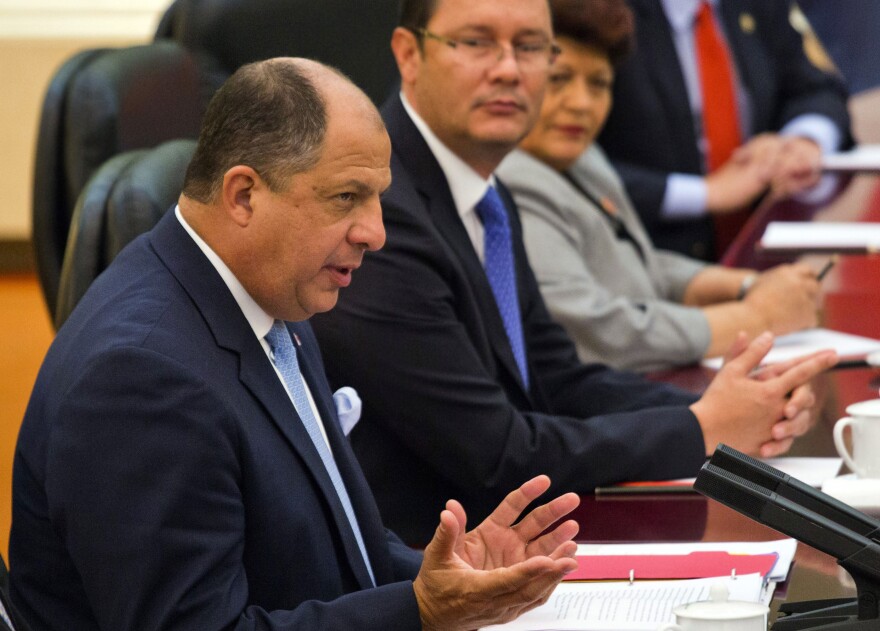Before Hurricane Michael hit the Florida Panhandle last week, it was a tropical storm whose torrential rains killed 13 people in Central America. That was just the latest bad news in Central America. Political unrest, dictatorial governance and criminal violence are oppressing much of the isthmus, and the region is starting to feel a bit like it did a generation ago during its civil wars.
Costa Rica has always been a relative oasis of democratic calm in Central America. Until May, Luis Guillermo Solís was Costa Rica's president – and he's now a professor at Florida International University's Latin American and Caribbean Center. Solís sat down with WLRN's Tim Padget to talk about Central America's troubles – and what if anything the U.S. can do to help.
Here are excerpts from their conversation:
READ MORE: Costa Rica Set to Elect a Professor to Recoup Country's Fading Luster
WLRN: This is actually your second round as an FIU professor. What's your attraction to the school and to South Florida?
SOLIS: Yes, I was a visiting professor at FIU 20 years ago. It has grown a lot since then and it's a tremendous university – this year it became one of the top 100 public universities in the U.S. Florida is like a second home to me; Miami is a community I admire very much. It feels good to be back.
In a sort of welcome-back lecture you gave at FIU last month, you said one of your biggest worries regarding this hemisphere is the "erosion of democratic governance and institutions" – and you included the U.S. in that concern. Are the Americas – and America –losing their democratic character?
In this hemisphere the populations of our countries are fed up with having to wait too much to get what they demand. It's deadly for democracy as a whole. –Luis Guillermo Solis
Well, I think the populations of our countries are fed up with having to wait too much to get what they demand. At a time when the middle classes are growing significantly – which is good news for the hemisphere –that becomes a very demanding population. And the governments not being able to provide their needs, like security – plus the misuse of power, corruption – I think it's a deadly combination for democracy as a whole.
As a result, there's a very likely possibility that we may have a very authoritarian government in Brazil soon...
You're referring to right-wing candidate Jair Bolsonaro...
Yes, Bolsonaro. A lot of people, myself included, are very, very concerned about this. And, you know, the United States is a very powerful influence in Latin America. But the ways in which power is being handled in the United States, with a certain disdain for institutions and the rule of law – it makes it complicated.
Let's look more specifically at Costa Rica's next-door neighbor Nicaragua – where people are calling on President Daniel Ortega to step down. They say he's created a corrupt dictatorship, and the unrest has wrecked the economy there. But he refuses to budge – and his security forces keep killing and jailing protesters. You know Ortega personally. What will it take to get him to give up power?
Ortega is not a kindergarten type. He plays raw and hard politics, and he learned in a bad way the lessons of the 1980s [during his first presidency], when he was willing to call for early elections and then he was out of office for more than ten years. And he doesn't want to repeat that. But he's doing worse. I think he's creating a monarchy. He is creating a dynasty...
Along with his vice president wife Rosario Murillo...
Exactly. But I see the Nicaraguan people, as an opposition, not allowing the government to break them down as [the regime has] been able to do in Venezuela, for example. And very soon the economic distress is going to be a major factor in Nicaragua.
FECKLESS ELITES
Certainly Central America's biggest problem is the horrific gang violence that's pushing so many people to migrate to the U.S. The U.S. wants them to stay home. But what more could the U.S. be doing to improve conditions in Central America so they feel like they can stay home?
Well, I don't know if it's a responsibility of the United States – or if it's more so one of the biggest challenges that political elites in Central America have. These countries' elites are not paying taxes. They're not doing enough planning. Their police forces are still very corrupt – our police forces, I should say. I'm not going to evade my responsibilities as a Central American, either.

Along those lines, you increased social spending in Costa Rica to combat inequality - but then you also confronted fiscal deficit and foreign debt problems. Was it harder than you expected moving from academia to being the president of a country?
Yes and no. I mean, it wasn't hard in the sense that I didn't change my demeanor too much. I kept on living in my house; I kept on going to the supermarket. In Costa Rica, a president can still do those things. But it is very hard – and perhaps harder in Costa Rica because you're serving a country that's accustomed to a certain standard of living. We're used to having a very good social security service and public education...
Compared to the rest of the region...
Yes, and not just compared to Central America but to Latin America as a whole. But now, being here working at FIU again with my wife – she's also a researcher at FIU – has given us the opportunity to be together after four years of running around in the presidency, which is always like a madhouse. A beautiful madhouse, but a madhouse nevertheless.



